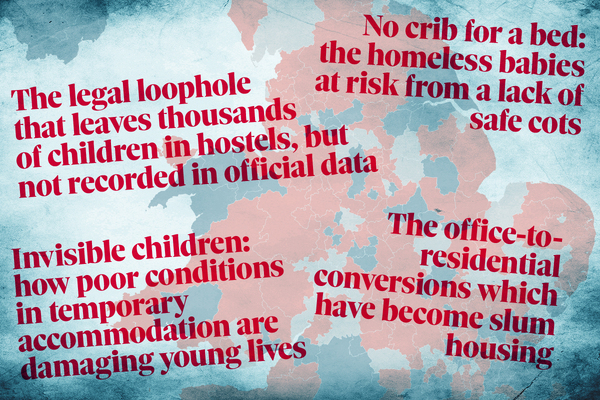You are viewing 1 of your 1 free articles
Frontline homelessness workers speak out
Half of frontline homelessness staff say their ability to help people has decreased, writes Duncan Shrubsole, chief executive of St Martin in the Fields
There was much talk of housing and building more homes at this week’s Labour Party Conference. While welcome, delivery on the ground is what really matters and cannot come soon enough.
At St Martin in the Fields Charity, we’ve surveyed the experiences of those working on the frontline of homelessness for the past seven years. This year, more than1,000 workers from across the UK responded and the findings are particularly stark.
The majority of frontline workers (84%) told us they’d seen an increase in demand for their services in the past year. Over half (58%) said their ability to help people access appropriate accommodation to help people out of homelessness has decreased, compared with 42% of staff last time we asked. And 47% reported their ability to prevent homelessness had decreased.
Even where accommodation is found, too often it is poor. A shocking 92% of homelessness workers reported it was difficult or very difficult to obtain suitable accommodation for the people they are supporting, particularly children, those needing to move away from abuse or who are trying to overcome multiple challenges.
With all forms of homelessness being at record levels – rough sleeping, seeking help from local authorities and the number of people in temporary accommodation – these extreme pressures are understandable. But they should still shock us and drive action.
Ask any person who has experienced homelessness and they say key to helping them was the support of frontline workers: outreach, key workers, hostel managers, advice workers, employment coaches, substance misuse workers and more.
“A shocking 92% of homelessness workers reported it was difficult or very difficult to obtain suitable accommodation for the people they are supporting”
I recently met a frontline worker in a service we fund in Wales. She was bursting with energy, talking about how she had built a rapport with people, earning their trust and then working through the issues they faced from securing housing, tackling debt, getting mental health support, helping them find work and to reconnect with their family.
She – and thousands of frontline workers – uses a range of skills to fulfil her role: empathy and the ability to build a connection, nous to navigate an increasingly challenging system and persistence to advocate and argue for other agencies to provide the help needed. Training plays a part, but experience is vital and needs to be developed and retained.
Yet, our survey highlights that frontline workers are themselves under pressure. Over half (53%) of homelessness workers said they were struggling to pay their bills and 44% to pay their own housing costs. Nearly one in four (23%) frontline workers worry about becoming homeless themselves.
The pressures of an ever more complex role means that over half (51%) of workers reported that they ‘always’ or ‘often’ feel at risk of burnout. People helping others out of homelessness, worried they could become homeless themselves, or doing so but paying the price in their own well-being – this cannot be right!
Short-term contracts and squeezed budgets for homelessness services affect pay and conditions and the ability to recruit and retain skilled staff. All of the central government funding programmes in England to tackle homelessness are due to end in March next year. And the state of local government finances is parlous and precarious.
Even if decisions are made by ministers to end the cliff edge and continue funding streams and to finance local government, typically that will be at the 11th hour, when charities and providers have already had to issue redundancy notices and some staff will have walked. Sadly, skilled homelessness workers are already leaving for other sectors such as retail or logistics which pay more.
“Over half (51%) of workers reported that they ‘always’ or ‘often’ feel at risk of burnout”
So we need sustained and long-term investment both nationally and locally in homelessness support services – starting with announcements in the Budget in October. And the government should, as in Wales, ensure that funding is at sufficient level and comes with a stipulation that workers are paid fairly.
Staff that are valued and properly remunerated is vital, but they also need more options to help people. We need investment in more supported housing and Housing First. We need many more social homes for rent and to ensure they are available to those experiencing or vulnerable to homelessness. Reform of the private rented sector and ending no-fault evictions needs to be matched with relinking Local Housing Allowance rates back to rental levels.
We know change is possible. Great strides forward have been made in tackling homelessness in the past when the government has stepped up and worked in partnership with the voluntary sector, such as the Rough Sleepers Unit and Supporting People programme, strengthening legislation and the Everyone In scheme. Key is the political will and leadership, backed by Budget and then the Spending Review next year.
Every case of homelessness prevented or solved saves misery for them and pounds to the public purse. Homelessness sector workers will continue to work their magic day in and day out. At St Martin in the Fields, we will continue to support them through our frontline network, providing opportunities to share best practice, access training and support. But the workers cannot do it on their own. It is time for action.
Duncan Shrubsole, chief executive, St Martin in the Fields
Sign up for our homelessness bulletin
Already have an account? Click here to manage your newsletters













